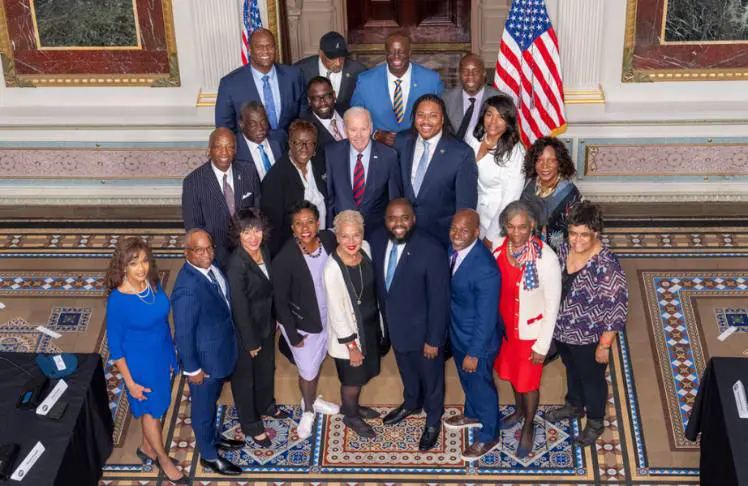
by Aziah Siid
Imagine being a high school student punished simply for refusing to cut the dreadlocks you’ve been growing for years. Or put yourself in the shoes of a student sweating — but still expected to learn — in a hot classroom without air conditioning or proper ventilation. Or maybe your local school is understaffed due to the nationwide teacher shortage, and there’s no one to teach special education, science, math, or foreign languages.
These are just some of the racial inequity-based realities President Joe Biden may have been thinking of when he created the Presidential Advisory Commission on Advancing Educational Equity, Excellence, and Economic Opportunity for Black Americans.
“Our nation’s schools and communities are irrefutably strengthened by the success, scholarship, and tenacity of Black students of all ages,” Biden said in his proclamation announcing the effort. “But our nation must go further to finally root out systemic barriers in our schools.”
The 21-member commission — which was sworn in by Vice President Kamala Harris in late October — is housed in the U.S. Department of Education. It’s charged with advising the Biden administration on the “development, implementation, and coordination of educational programs and initiatives to improve opportunities for Black Americans.”
Its members come with the experience the Biden Administration needs to make the commission’s goals a reality. Malcolm Kenyatta, a member of the Pennsylvania House of Representatives who is a vocal champion of equitable funding for public schools, serves as the chair. Other members include National Education Association President Becky Pringle and Secretary-Treasurer of the American Federation of Teachers Dr.Fedrick Ingram, who are deeply connected to what teachers and students are dealing with on a day-to-day basis.
Jared Bass, senior vice president of education at the Center for American Progress, says the goals of this initiative are vast, but are centered on addressing the inequities that directly impact the educational outcomes for Black students.
A school is “the epicenter of community,” Bass says. “We need to be thinking about our schools, too, as part of our infrastructure,” he says.
To that end, Bass says systematic barriers like food scarcity, lack of transportation to school programs, and the disproportionate percentage of Black students being suspended are some of the issues the commission will need to address.
Bass, who previously served in the Obama administration as a senior policy adviser within the Office of Planning, Evaluation, and Policy Development at the U.S. Department of Education and as the lead higher education staffer on the House Committee on Education and the Workforce — Democratic Staff, says policymakers have to consider how these challenges keep kids from achieving academically, and ultimately, being unprepared for the workforce.
“We don’t just want to have education for education’s sake. We want to have education, so people have economic opportunity,” he says.
Instead of taking a siloed approach to solving the challenges facing schools, Bass says policymakers need to ask, “How do we get the Department of Transportation involved in the game? How do we get these other sectors involved? And how are we supporting not just what’s happening in the classroom, but all those social supports and barriers to structural barriers.”
Community Voices and Cultural Competency
With Title I under attack and facing a potential 80% funding cut, Bass says we can’t lose sight of the funding issues that impact whether schools and students have the resources they need.
“Making sure we have funding for things like AP courses — and just making sure that opportunity is equitable within the system itself, is important,” Bass says.
To effectively determine the path forward, Bass says the commission has to connect with people at the local level to hear what Black families, students, and educators need.
And the experts on the commission likely are already thinking about how “making sure content is culturally relevant to students” is critical. “A lot of research says having a teacher of color, especially for Black boys, having a Black male teacher of color just pays dividends for them, their educational journey and success,” Bass says.
Students also need “a sense of belonging,” Bass says, “especially in Black and Brown communities.”
Our kids need “to know that communities know that they belong in school, that they belong in the classroom, that they belong in boardrooms, that they belong in these places — that sometimes it may seem that like people are trying to drive them out of that, but they belong there.”















